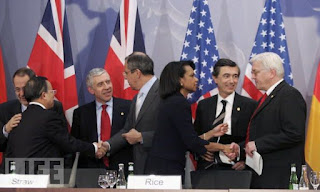Solana, Straw, Fischer, and de Villepin have a lot to answer for since their policy bought Tehran crucial time.
By ALEJO VIDAL-QUADRAS
Wall Street Journal Europe - Iran's President Mahmoud Ahmadinejad boasted last week that the regime would install 60,000 new, "third-generation" centrifuges to enrich uranium. As world leaders met in Washington this week to discuss how to prevent nuclear terrorism, there was little doubt that time is running out to deal with Iran's nuclear weapons threat.
It is now eight years since the opposition National Council of Resistance of Iran blew the lid on the mullahs' secret atom program and disclosed the existence of a uranium enrichment plant in Natanz and a heavy water plant for the production of plutonium in Arak. The NCRI also blew the whistle on the secret enrichment site in Qom back in 2005, a fact that was confirmed by world powers only last September. And yet, during all that time, Tehran has been allowed to make steady progress toward developing nuclear weapons.
Iran has had a lot of help along the way from what can only be described as appeasing policymakers who offered concessions and incentives, while telling the world that they could get the regime to change its behavior. And the regime did change its behavior: Supreme Leader Ayatollah Khamenei replaced the supposedly moderate President Mohammad Khatami with the fanatical Mahmoud Ahmadinejad while Iranian officials continuously vowed not to back down one "iota" from their nuclear projects.
Regrettably, the European Union was one of the main culprits in facilitating Iran's nuclear progress. Particularly the EU's former high representative for foreign policy, Javier Solana, as well as the former British, French and German foreign ministers—Jack Straw, Dominique de Villepin and Joschka Fischer—have a lot to answer for. It was they who devised this policy of "constructive engagement" and thus bought the regime many of the eight years they have had to advance their nuclear program.
The most popular excuse for the failure of their Iran policy was that U.S. reluctance to negotiate directly with Iran supposedly prevented a breakthrough with the mullahs. When President Obama took office, there was much hope in Europe. Last year, he extended his hand to the Iranian leadership and set a number of deadlines for a negotiated settlement of the dispute. Iran, though, quickly repelled Mr. Obama's hand. The President's deadlines came and went without any Iranian "engagement."
Now it was Washington that bought the regime additional time. The White House failed to quickly gather a coalition of the willing to implement the "biting" sanctions it had threatened. Instead, more than three months after the end of the last deadline the U.S. administration had set, "biting" sanctions are not even on the horizon. At best we can expect that after weeks of haggling in the United Nations Security Council, there will eventually be much watered-down sanctions that won't be able to stop Tehran.
Engagement with Iran has been based on the false premise that the mullahs would respond to carrots and somehow act in Iran's national interest. In diplomacy, there is only one thing more dangerous than failing to respond firmly to threats to international security, and that is threatening to respond firmly, but failing to follow through. The Iranian regime knows now, if it had any doubts before, that the international community lacks the courage or conviction to confront its nuclear program.
One reason why our leaders pursued a policy of appeasement toward Iran over the past decade was that they argued, falsely, that the only alternative was a military attack on Iran. Biting sanctions, though, could have and still could work. Of course, a military confrontation with Iran would be devastating for its 70 million people. But allowing the regime to gain weapons of mass destruction could in the end be even more devastating for Iran and the entire region if it triggered a wider war. Engaging the mullahs only had the effect of legitimizing them and extending their brutal reign.
It is time for Europe and the United States to redouble their efforts for winning as broad a coalition as possible for biting sanctions that stand a chance of changing the regime's behavior. Equally important will be to politically support the opposition and the millions of brave Iranians marching on the streets and demanding change and democracy. Summits in Washington are fine, but Iran is moving much faster than that. So we'd better catch up.
Mr. Vidal-Quadras, a professor of nuclear physics, is vice president of the European Parliament.
Source:
http://online.wsj.com/article/SB10001424052702303828304575179683031919088.html?mod=googlenews_wsj
Friday, 16 April 2010
Subscribe to:
Post Comments (Atom)






No comments:
Post a Comment